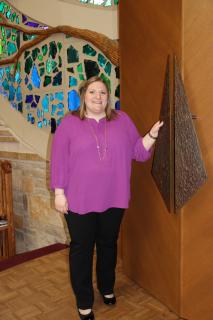Each and every Shabbat morning wherein a child becomes bar/bat mitzvah, without fail, I find myself teary eyed as the Torah scroll is passed Midor Lador – from generation to generation, ending up in the hands of the bar or bat Mitzvah him/herself. Many of these young Jewish adults comment about the physical weight of the scroll. The truth is that the heaviness of the scroll is appropriate for the gravity of the tradition found within. Our sage, Hillel, managed, however, to boil all of the weighty teachings of our tradition down to one maxim, “What is hateful to you, do not do to others. All of the rest is commentary. Go and learn it.”
Hillel, in his wisdom extrapolated from Leviticus 19:18, “You shall not take vengeance or bear a grudge against members of your people. Rather, v’ahavta l’reacha kamocha – love your fellow as yourself; I am Adonai,” perhaps the most inspirational words found in the whole of the Torah. It feels ironic, however, that we read these beautiful words each year in the same week that we read words that have caused perhaps more damage and deep hurt than any others in our tradition. I’m referring to the prohibition against male homosexual intercourse found in Leviticus 20:13. Both of these verses appear in Parashat Kedoshim, and unfortunately, the latter verse seems to have at least as much impact as the former. We needn’t look any further than so-named “religious freedom” bills in Mississippi and North Carolina to underscore the damage of these words of Torah.
I could easily discuss the intricate interpretations of Leviticus 20:13, explaining that perhaps the prohibition isn’t so far reaching, or isn’t talking about committed homosexual relationships like the ones we honor and celebrate today. I would, however, rather discuss the imperative to love your fellow kamocha – as yourself. Commentators throughout history ask exactly what it means to love somebody else kamocha – as yourself.
In her teachings, Nehama Leibowitz draws attention to the writing of R. N.H. Weisel who offers, “Love thy neighbor who is kamocha as thyself – like you, created in the image of God, a human being like yourself.” In other words, perhaps kamocha refers to the notion that each and every human being is created in God’s likeness; therefore, we all share a godly likeness with one another, and thus if we love God, then we must love each other.
Our sage, Rashi, quotes Rabbi Akiva’s teaching that the commandment, “love your fellow as yourself” is a klal gadol – a central principle of Torah. Perhaps, however, this principle is central not only because it creates a culture of kindness and decency among people, but rather it is a central principle because we acknowledge our likeness to God by emulating God and showing love to one another.
This brings us back to the hateful words, prohibiting certain homosexual acts, found in Leviticus 20:13. Can these hurtful words be as holy as the imperative to love our fellow human being? In their book, “The Bible Now,” Richard Elliott Friedman and Shawna Dolansky pose, “Why do people assume that things relating to God must be absolute and unchanging? Even for a person who believes in God wholeheartedly, why should that person imagine that God is never free to change? That is certainly not the biblical view of God. God regrets. God changes divine decisions. God listens to humans and reconsiders.” Friedman and Dolansky boldly suggest that some of God’s own views are eternal, and others may not be. This brings us back to Rabbi Akiva’s understanding of Leviticus 19:18, the imperative to love our fellow as ourselves, as central or eternal. It follows then, that we must treat all of our fellows, including those who identify as LGBT with love, for acting with love is central to our tradition, whereas some of the other “do’s” and “don’ts” simply are not.
The beauty of our tradition is that it lives and breathes. We can decide to focus on love rather than anything else. We can emphasize one teaching over another. We are holy when we love God and act with love even towards those who we might not understand, for we all share the quality of being created in God’s image. This is the teaching that is passed down from generation to generation, all of the rest, as Hillel said, is commentary.
Rabbi Rachel Kaplan Marks is assistant rabbi at Congregation Shalom in Fox Point. She is originally from suburban Chicago and spent many summers as both a camper and staff member at Olin-Sang Ruby Union Institute, the Reform Movement’s summer camp in Oconomowoc. D’Var Torah columns represent the views of individual authors and all area clergy are invited to consider submitting a piece for this space.



